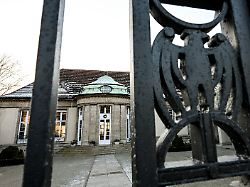Faeser about Lehnitzsee meeting
“This brings back memories of the Wannsee Conference”
January 20, 2024, 1:42 a.m
Listen to article
This audio version was artificially generated. More info | Send feedback
The meeting of right-wing radicals in Potsdam reminds Federal Interior Minister Faeser of the Nazis’ Wannsee Conference. She is skeptical about an AfD ban proposal, as well as the attempt to deprive AfD politician Höcke of his basic rights.
Federal Minister of the Interior Nancy Faeser is reminded of the Wannsee Conference of the National Socialists in 1942 by the recently announced meeting of right-wing radicals in Potsdam. “This involuntarily brings back memories of the terrible Wannsee conference,” said the SPD politician to the Funke media group.
She doesn’t want to equate the two, says Faeser. “But what is hidden behind harmless-sounding terms like ‘remigration’ is the idea of expelling and deporting people en masse because of their ethnic origin or their political views.”
At the same time, Faeser said, with a view to comparisons with the rise of the National Socialists, that Germany is a different country today than it was in the 1930s. “Nevertheless, we must be careful and recognize the threat to our democracy.”
Expulsion was discussed at Lehnitzsee meetings
According to reports from the media company Correctiv, a meeting of right-wing radicals took place in Potsdam on November 25th, in which several AfD politicians also took part. The former head of the right-wing extremist Identitarian movement in Austria, Martin Sellner, said he spoke about “remigration” there. When right-wing extremists use this term, they usually mean that large numbers of people of foreign origin should leave the country – even under duress. According to the report, Sellner specifically included German citizens in his expulsion plans.
At the Wannsee Conference, the Nazis made plans to deport and murder Europe’s Jewish population. The building in which the representatives of the Nazi regime met is not far from the hotel on Potsdam’s Lehnitzsee where the right-wing radicals met in November.
Faeser against application for a ban and deprivation of fundamental rights
Faeser is skeptical about an AfD ban. “Our constitution rightly provides for this strongest instrument of defensive democracy as the last resort.” Given the circumstances, no one can rule this out. However, this is not a means in the political debate. “If people turn to such a party, we have to ensure that these people come back to the democratic parties.”
Faeser also sees little chance of depriving the right-wing extremist AfD politician Björn Höcke of his basic rights in order to prevent him from being elected to political office. “In the history of the Federal Republic, the Federal Constitutional Court has never ruled that a person has forfeited their fundamental rights,” said Faeser. There are high hurdles here. “That’s why Mr. Höcke and his Thuringian AfD regional association, which is classified as right-wing extremist, must first be concerned with the political debate.”
“The AfD despises our modern Germany”
An online petition directed against Höcke has exceeded the one million signature mark. The petition demands that the federal government submit an application to the Federal Constitutional Court for the forfeiture of fundamental rights in accordance with Article 18 of the Basic Law.
According to this article, individual basic rights can be taken away from anyone who “abuses them to fight against the free, democratic basic order”. For example, the right to vote or the power to hold public office could be revoked.
Faeser urgently warned against the AfD taking over government. “The AfD despises our modern Germany,” she said. “She wants to roll back the role of women, attack free media and the independent judiciary – and obviously doesn’t have many people with an immigration background in our country.”
